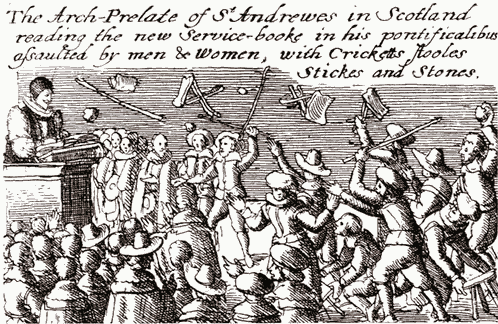
An agreement inaugurated by Scottish Presbyterians on 28 Feb 1638 in Greyfriars' Church in Edinburgh, to reject—while maintaining their loyalty to the king—the attempt by King Charles I and William Laud, archbishop of Canterbury, to force them to conform to English Episcopacy. Charles's foolish reaction to it would lead, within a few years, to the English Civil Wars.

Greyfriars' Church, Edinburgh

By the end of the 16th Cent the Scottish church was already passionately presbyterian. In 1637, however, King Charles,enamoured with Bishop Laud's High Churchism, and in an attempt to bring about a unity between the Scot and English Church, imposed Anglican episcopacy upon the Scotch church. The response from the Scotch church was instant and violent, as chairs, stools, sticks and stones were thrown a the prelate reading the new service of worship in St Andrew's.

In the months that followed, a movement began to materialize, formalized in the signing of the National Covenant in Greyfrairs, in which the thousands of signatories vowed to protect the purity of the Kirk from such innovations as perceived in the King's attempt. In particular, the covenant harked back to the Confession of Faith signed by King James VI in 1581 and enshrined by Acts of Parliament, but it also stressed their loyalty to King Charles (i.e., the Covenant was to be understood as a spiritual-religious act, not political rebellion).
In the months afterwards, however, the Covenanters (those who signed the covenant) became more and more involved politically in the face of Charles's intransigence, and ended in war between Scotland and England (what became known as the Bishops' Wars). When Charles failed to get the English parliament to vote him the money to fight the Scots, and England descended in the Civil War, the miliatary alliance between the Covenanters and the English parliamentarians greatly helped to bring about the king's defeat.

©ALBERITH
160217lch